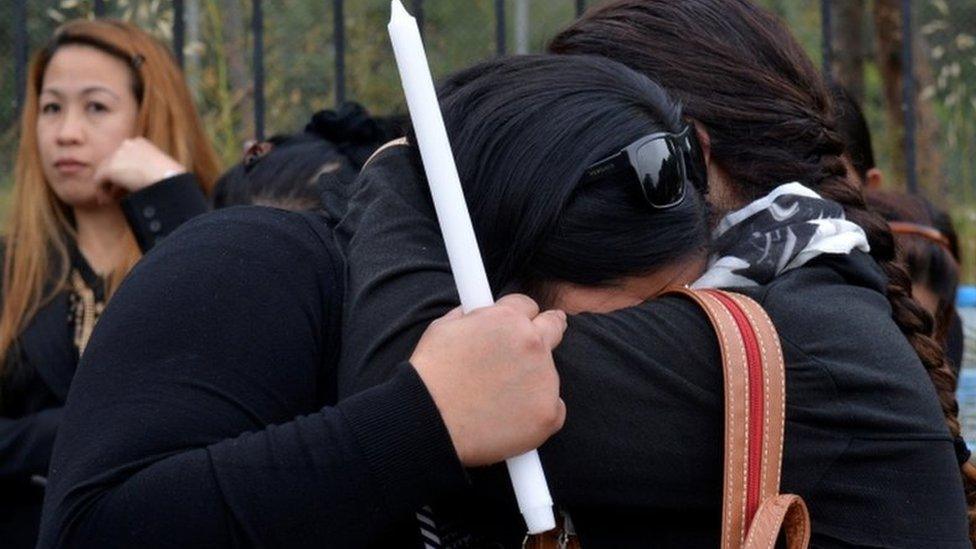Cyprus serial killer case exposes abuse of migrant women
- Published
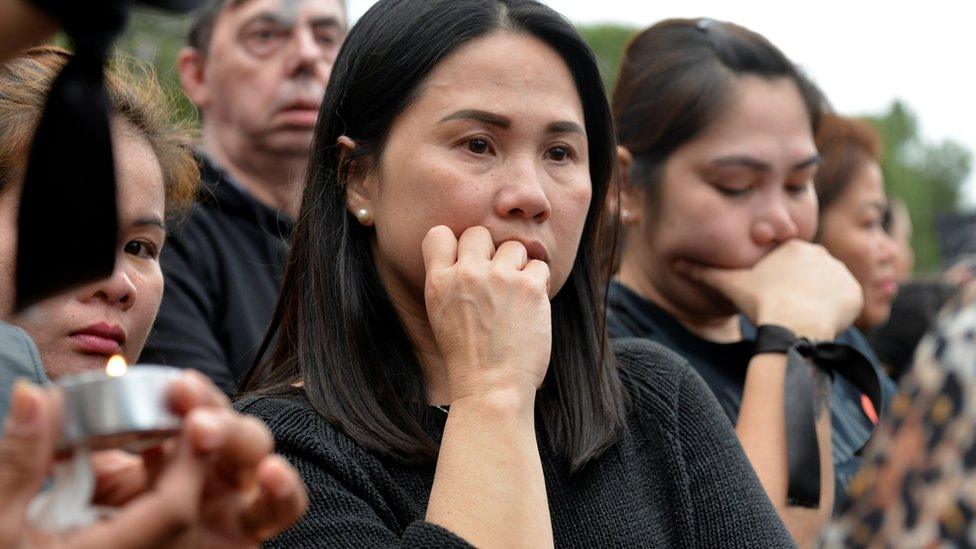
Members of the Filipino community in Cyprus attended a vigil for the victims on 26 April
Cyprus has been left devastated after an army officer confessed to the murder of five migrant women and two girls, in what is believed to be the island's first serial killing.
Amid the shock, protesters have accused police of failing properly to investigate the victims' disappearances because of their migrant backgrounds.
Mary Rose Tiburcio, Arian Palanas Lozano and Maricar Valtez Arquiola were all domestic workers from the Philippines. Also among the victims were a woman of Indian or Nepalese descent, a Romanian woman named locally as Livia Bunea, her young daughter Elena and Ms Tiburcio's daughter, Sierra, 6.
The case has exposed an exploitative system that allows tens of thousands of migrant women to work as housemaids in conditions that critics have described as akin to modern slavery.
"The killings are a wake-up call," says Lissa Jatass, a domestic worker who campaigns for the rights of migrant women in Cyprus. "Housemaids here suffer with this bad system. Women here are the least represented in society," she said.
Several of the victims were reported missing when they first disappeared. Police say an inquiry has been launched to identify any failings or wrongdoing on their part, and Cyprus's justice minister resigned.

One of the women's bodies was found in a suitcase at the bottom of the Red Lake on 28 April
Ester Beatty of the Philippines Organisation in Cyprus said women came to work in Cyprus because it was part of the European Union and they felt "a bit more relaxed". Their contracts require their employers to provide them with free food and accommodation.
But Ms Beatty regularly deals with complaints from women whose monthly salaries are well below the minimum €400 (£340;$450). Despite signing contracts that stipulate a 42-hour working week with one day off, Ms Beatty said women frequently worked 12-14 hours a day with little or no holiday and often suffered sexual harassment.
The Cyprus government says that if the terms of a contract are violated a "rigorous procedure has been established" to deal with a complaint. It "continuously strengthens its efforts for improving the working conditions of all non-EU national workers", the government said in a statement.
'We sacrifice our lives'
Santie arrived in Cyprus from the Philippines in 2011. "We come here and sacrifice our lives. We have families to give food, children to send our salary to. We do this to support our children," she said. "But they are treating us like slaves."
Women find work in Cyprus through agents in their home countries, most commonly the Philippines, Vietnam, Sri Lanka, India and Nepal. They pay an initial fee of $2,000-$7,000.
Although the government says such fees are illegal, Santie took a bank loan to pay hers and spent her first year in Cyprus just paying off the interest. Her first employers paid her the minimum €400 a month.
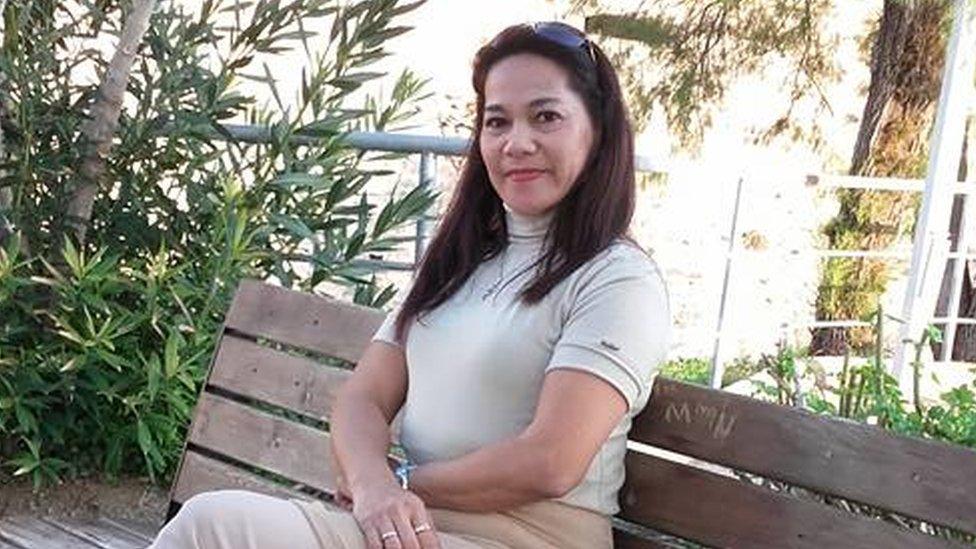
Santie says her experience is not unusual: "Lots of girls have these experiences"
Within three months, Santie alleges, she was being sexually harassed. She complained to her agent, who told her she would need to spend six months with the couple before the agent could "release" her and let her work for someone else.
The agent tried to convince her that the sexual harassment "was only a friendly touch", but eventually she ran away because she was so afraid.
Sexual harassment is a familiar story. Another woman, Liza, worked for an elderly couple. She said the husband would repeatedly ask her to join him in bed, to touch him and hug him. She alleges she was also assaulted by a man for whom she was working part-time.
Asked if she had reported any of the incidents to the police, she laughed. "They won't do anything."
Police in Cyprus say they fully investigate complaints of sexual harassment, and if a case is established it is forwarded for criminal prosecution.
The government says any worker who feels they are a victim of sexual harassment is given full protection under Cyprus law and cases are examined by a specialised unit.
'I was afraid to go back'
Both Santie and Liza's agents eventually agreed to release them, but this presented another set of difficulties. Workers who are "released" need to find new employers within a month, otherwise their work permit becomes invalid and they risk being deported.
"I was afraid to go back to the Philippines because I hadn't paid my fee," Santie said.
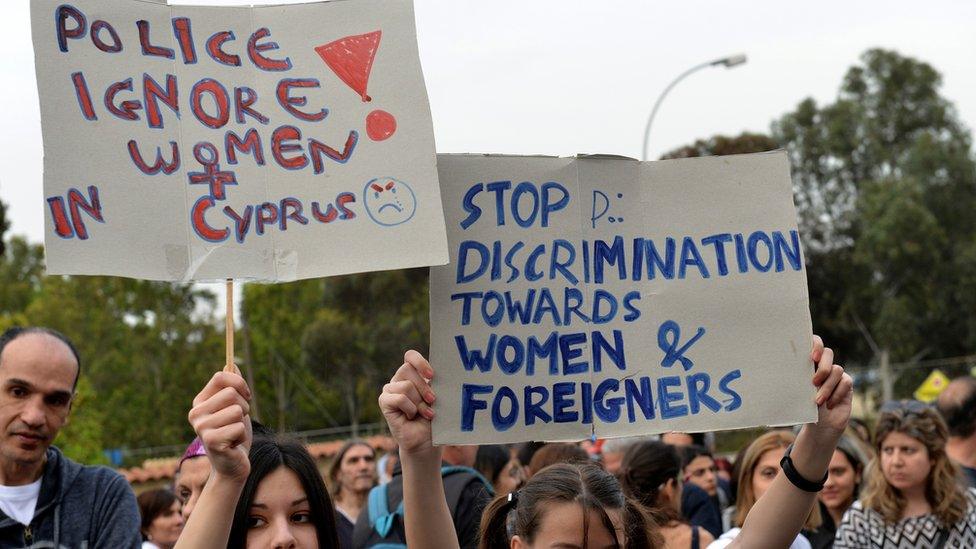
A second protest has been organised for Friday calling for the president to "dismiss those responsible" for the women's deaths
Doros Polykarpou, executive director of Kisa, an NGO supporting migrants in Cyprus, said this was common.
"You can imagine how much pressure not to lose your employer or your residency because you cannot return without returning this money that you borrowed," he said.
Mr Polykarpou said that many of the agents actively encouraged employers to terminate contracts. "The more people they circulate the more profit they make," he said.
'Treating us like slaves'
Santie found new employers, but says she was made to work 14 hours a day, six days a week, contravening the European Union laws. She was not paid for annual leave.
"They asked me to work in the restaurant, the house, outside the house," she said.
Four months in, her salary was slashed by half as the employers said they couldn't afford to pay the rest. She was told to go and look for part-time work to compensate, even though Cyprus limits domestic workers to one employer.
Cristina Fontanos Casas had a similar experience. She was a domestic help for a family and their grandmother, but was also forced to help at the family's restaurant.
"The restaurant had very many customers and I worked from seven in the morning until six or seven at night," she said.

Cristina Fontanos Casos moved to Cyprus from the Philippines in 2014
Ester Beatty says it is common for domestic workers to be shared between three families so they can share the cost, even though it is against the law.
"They often don't get a proper day off," she said. "As well as working as cleaners, they are obliged to go back before dark to look after the grandmother."
'Isolated and vulnerable and excluded'
Mr Polykarpou said Cyprus introduced a temporary law to let migrants into the country in 1991 to fill gaps in employment.
"The model went out of control and led to a situation where 20% of the population were migrants," he said, estimating the island's migrant population at between 70,000 and 80,000.
On an island whose Greek and Turkish populations have been divided since 1974, he suggests Cypriots are in fear of their identity and have come to fear migrants.
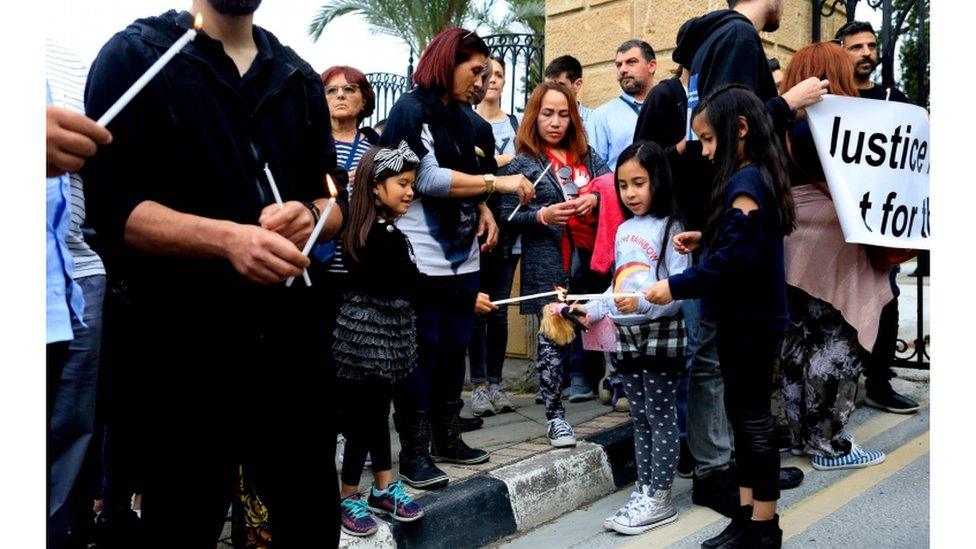
Migrant workers and their children lit candles to remember the victims of the murders
Although Cyprus insists all migrants are entitled to the same social protection as Cypriots, workers complain of very basic health care with no dental or gynaecological provision.
Ester Beatty describes helping several older migrant women fight for their pension, even though they have paid contributions for years. "They will pass you from one place to another until eventually you give up," she said.
"The discrimination here is huge. Racism is rampant."
"The whole system is built to keep them isolated and vulnerable and excluded," said Mr Polykarpou. "It is similar conditions to modern slavery".
- Published11 December 2017
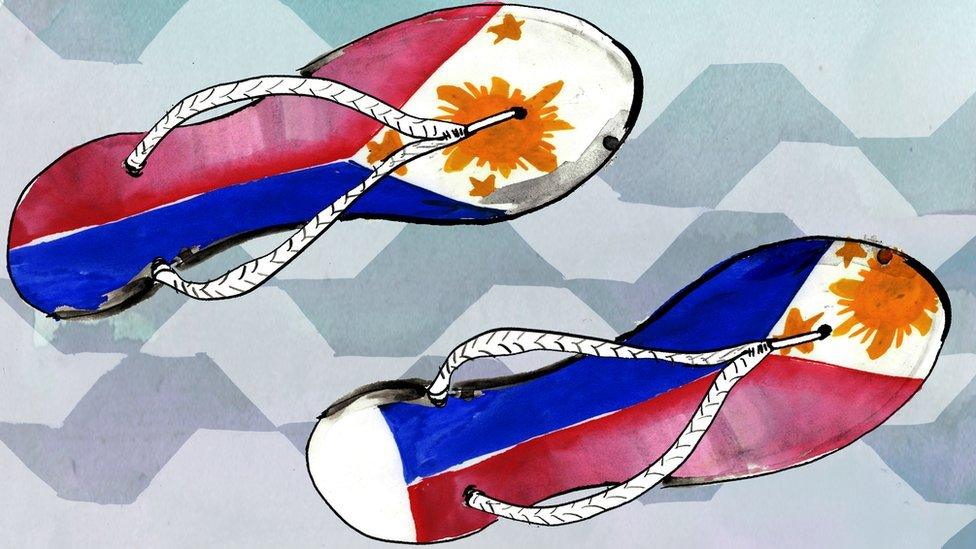
- Published7 April 2023
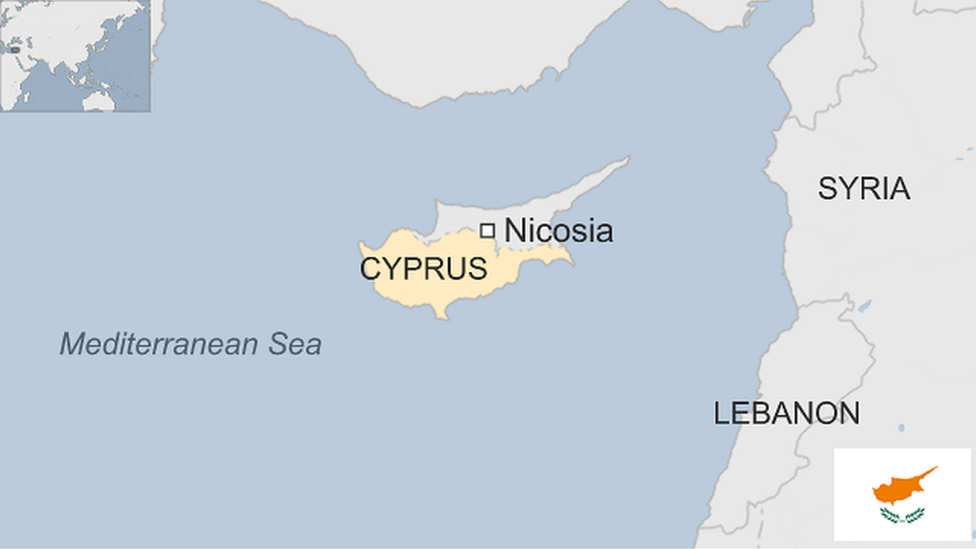
- Published28 April 2019
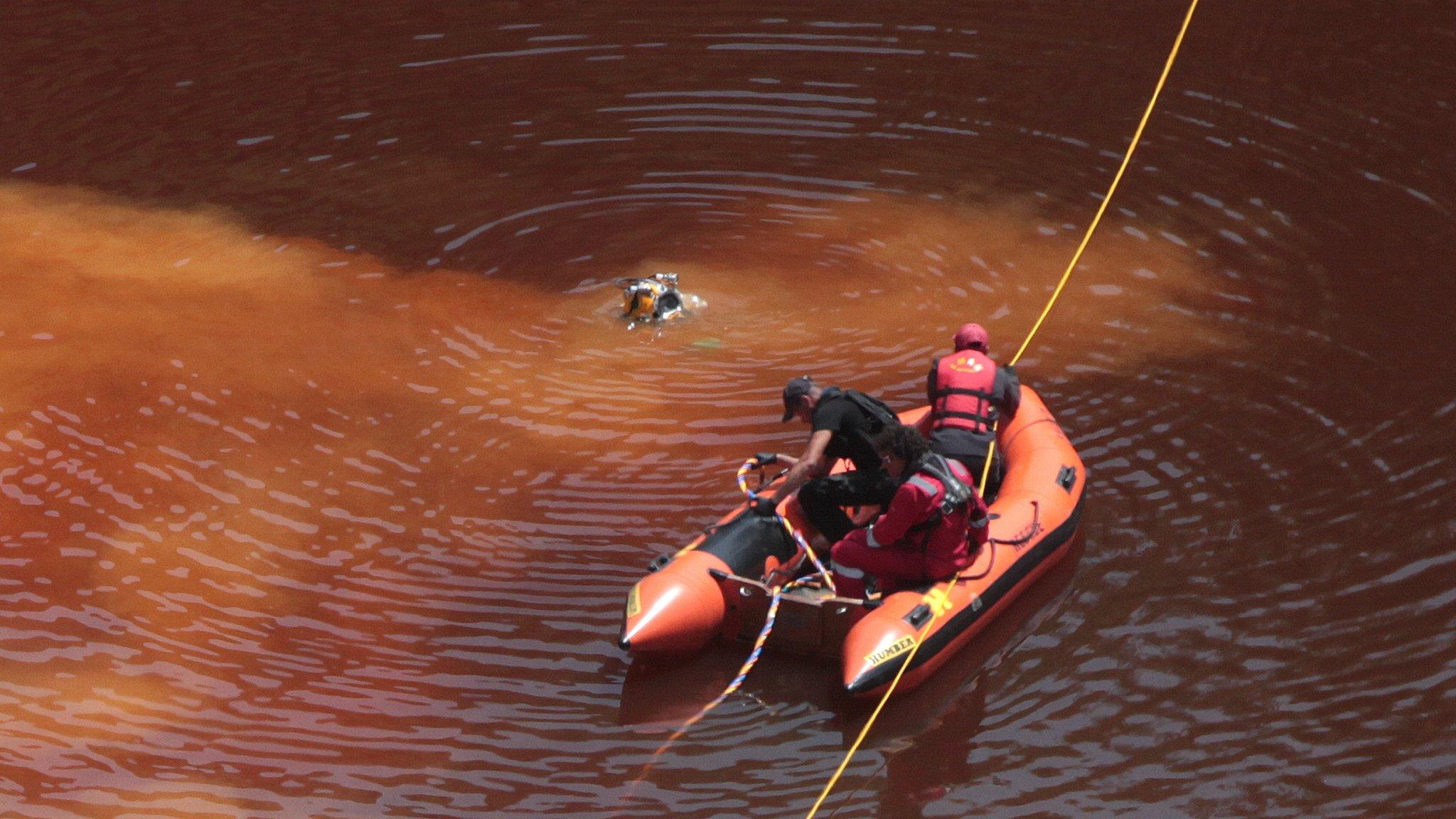
- Published26 April 2019
